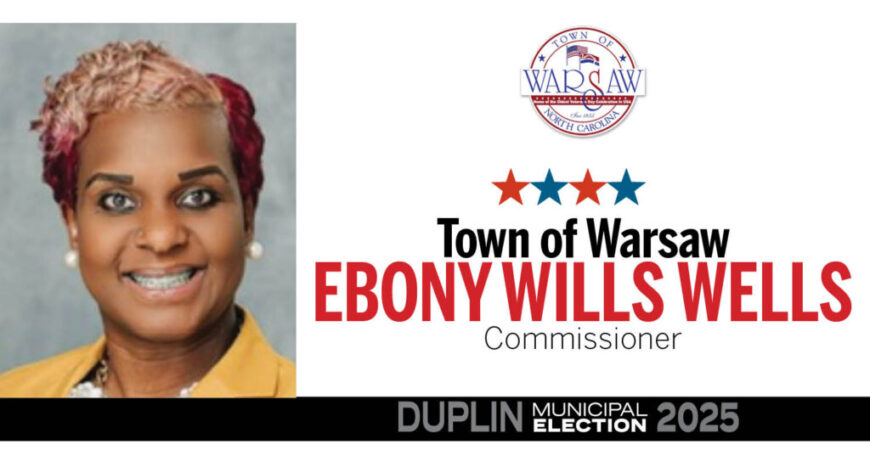Candidate Q&A series | Warsaw Commissioner
Incumbent Ebony Wills-Wells
In this Q&A, Councilwoman Ebony Wills-Wells reflects on her first term in office, outlines her top priorities if re-elected, and shares her vision for restoring trust, fixing critical infrastructure, and making local government more accountable to the people of Warsaw.
Looking back on your tenure, what accomplishment are you most proud of, and how has it tangibly improved the quality of life for Warsaw residents?
While I don’t come from a background in politics, I have been deeply involved in our community and government, serving as a city councilwoman for four years in this town of Warsaw. I’m also a long-time community pillar, stakeholder, resident, homeowner, and small business owner. My professional background is in corporate management, business, and education where my job has always been to solve complex problems with limited resources, listen to stakeholders, and deliver results on time and on budget.
I am honored to be the chosen vessel to give back through yearly community outreach, implement programs such as “Shop with a Cop” post pandemic, support the reintroduction of National Night Out, and so much more.
I am not seeking a higher office; I am asking for your vote to continue as a councilwoman because I want to finish what I started. During my four years on the council, I have consistently fought for the very issues we’re discussing today: responsible spending, transparent government, and prioritizing our essential infrastructure. Too often, I have been a minority voice in those efforts. My motivation for running for re-election is to build a working majority on the council that is committed to getting our town back on track and finally putting the basic needs of our residents first.
Looking ahead, what are your top three priorities if reelected, and how do these priorities directly respond to the most pressing concerns you’ve heard from the community?
Upon being re-elected, my focus will be on building a coalition to take immediate action.
Introduce a “Transparency Ordinance”: In the first council meeting, I will introduce a comprehensive ordinance to legally mandate the transparency initiatives I’ve outlined, including live-streaming meetings and creating a public documents portal.
Force a Vote on Infrastructure Audits: I will formally move to allocate funds for independent, third-party audits of our wastewater, drainage, and financial systems, forcing a public vote and putting every council member on the record.
Propose a Budget Amendment: I will propose an immediate amendment to the current budget, calling for a freeze on all non-essential capital projects and the reallocation of those funds to an infrastructure emergency repair fund.
Warsaw continues to face long-standing violations of wastewater treatment standards, largely due to persistent organic overloading from two major industrial users. What specific reforms have you proposed or would you advocate for to prevent future violations? How should the town strengthen oversight and accountability for industrial users?
The repeated violations are a sign of systemic neglect. Restoring compliance and trust requires immediate action and long-term reform.
Immediate Independent Audit: My first act upon re-election will be to formally request funding for an independent, third-party engineering audit of our entire wastewater treatment system to identify all deficiencies and non-compliance risks. This report must be made public.
Capital Investment Plan: Using the audit, we must develop a fully-funded, multi-year Capital Improvement Plan (CIP) specifically to upgrade our wastewater infrastructure. This must be the council’s top budget priority. We must aggressively pursue state and federal grants to supplement local funding.
Reforms for Prevention:
Stricter Maintenance Protocols: We will implement a rigorous, preventative maintenance schedule, moving away from a “fix it when it breaks” model.
Citizen Oversight Committee: I will propose the creation of a citizen oversight committee, including residents with relevant expertise, to review compliance reports and monitor the progress of the infrastructure upgrades. This ensures ongoing accountability.
In August, millions of gallons of “partially treated” wastewater were released into Stewart’s Creek, but the public wasn’t notified for five days. You were the only official who raised the alarm before the town’s press release. What do you think caused the delay in getting the information out? and what steps is the board taking to improve staffing, emergency response protocols and public health risk communication?
The handling of the Stewarts Creek spill was an unacceptable failure of leadership and a breach of public trust. As a member of the council, I will push to implement a new emergency communication protocol with zero ambiguity.
Immediate Alert System: We will establish a multi-channel emergency alert system that residents can sign up for (text, email, automated phone calls). For any incident involving public health or environmental safety, a public alert must be issued within one day of town leadership being notified.
“Inform First, Detail Later” Policy: The first alert will state what we know, where it happened, and what immediate precautions residents should take. Detailed follow-ups will be provided as more information becomes available. The guiding principle is to never let the quest for perfect information delay the delivery of vital information.
Full Public Debrief: After any such incident, the council must hold a public meeting and publish a full after-action report detailing the cause, the response, and the long-term corrective actions being taken.
What steps do you believe the town should take to improve transparency and accountability in its financial oversight processes? and what strategies would you use to restore trust between leadership and residents?
Trust isn’t restored with promises; it’s rebuilt with consistent and transparent action. My strategy is built on three pillars:
Action & Commitment to Transparency: We will make town government an open book. This means live-streaming all public meetings, posting all non-confidential documents and contracts online in an easy-to-search format, and creating a public-facing dashboard that tracks the progress of major projects and key performance indicators for town services.
Advocate & Proactive Communication: We will move from a reactive to a proactive communication model. This includes regular town hall meetings held in different neighborhoods, a monthly summary of town business, and an “Ask the Council” portal where residents can submit questions and get timely public answers.
Accessibility & Accountability and Ownership: When mistakes are made, we will own them immediately, explain what happened, and detail the steps we are taking to fix the problem and prevent it from recurring. Trust requires admitting when you’re wrong and showing you’ve learned from it.
As the only woman currently serving on the board, what have been some of the biggest challenges you’ve faced?
The stigma against women in politics persists. As the sole woman leader in my arena, I’ve met considerable opposition. My approach has centered on leveraging strong support networks, directly challenging gender bias, and tirelessly advocating for equal reforms.
You’ve often said during meetings that you’re “only one commissioner.” What changes would you like to see in how the board operates and makes decisions? In your view, how can Warsaw’s leadership improve in terms of collaboration and responsiveness to residents?
My approach is a disciplined, three-step process that I have been advocating for during my time on the council:
Honest Assessment: First, we must stop guessing. We must use comprehensive, data-driven audits to understand the full scope of our infrastructure and service deficiencies. We need to know exactly what is broken, what is at risk, and what it will cost to fix it.
Strategic Investment: Based on that assessment, we must create a long-term, prioritized Capital Improvement Plan. We must fund this plan by reallocating existing resources away from non-essential projects and aggressively pursuing every available dollar in state and federal infrastructure grants.
Accountable Execution: We must manage these projects professionally and transparently. I will push for public-facing dashboards so residents can track the progress of every major infrastructure project. We must restore public services by investing in our public works department, ensuring they have the modern equipment and training needed to do their jobs effectively.
In the FY 2025–26 budget, the town allocated just $63,000 to drainage, while more than four times that amount was directed to the DreamWorks recreation facility. Would you have prioritized that funding differently? If not, how do you explain that decision to residents who are calling for basic infrastructure needs to come first?
Yes, I would absolutely Re-Visit this priority. While recreational facilities are valuable community assets, the need to prioritize urgent needs is a must. A government’s primary duty is to provide for the health, safety, and welfare of its citizens. Safe roads, reliable wastewater, and homes that don’t flood are fundamental to that duty.
To the residents demanding basic services first, I say: you are right. My justification is simple: A family can’t enjoy a new park if their street is flooded or their wastewater is unsafe. We must immediately pause funding and construction on any new large-scale recreational projects until we have a concrete, funded plan in place to address our critical infrastructure deficit.
This budget allocation is a perfect example of misplaced priorities. Critical infrastructure is being underfunded because it isn’t glamorous. A new drainage system doesn’t have a ribbon-cutting ceremony like a new recreational facility. The council majority has prioritized highly visible “wants” over the less visible but essential “needs” of our community.
I will continue to fight to change this by making the budget process a reflection of our core responsibilities. I will champion a “Basics First” budgeting principle. Public safety, clean wastewater, functional roads, and effective drainage are non-negotiable. We must fund these core services to the level required before we allocate significant funds to discretionary projects.
Let me be clear: There is no justification for this. It is a complete dereliction of duty. I have argued this on the council floor. Kicking the can down the road on drainage is not a savings; it’s an accrual of future costs in property damage, emergency repairs, and declining quality of life for our residents.
 Twitter
Twitter Facebook
Facebook Instagram
Instagram






